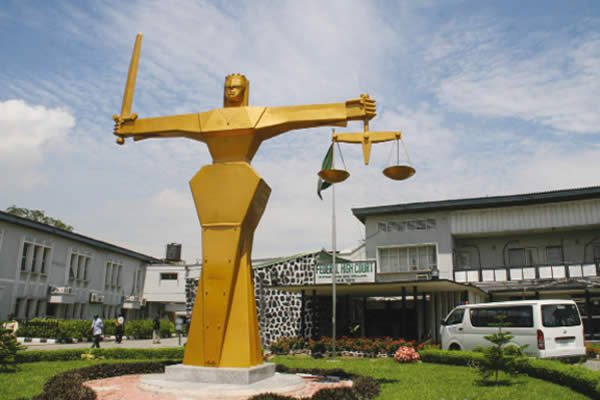BY CHIDI ANSELM ODINKALU
SEVEN years after his emergence as Nigeria’s military Head of State, in the third quarter of 1974, General Yakubu Gowon placed a telephone call to the then Chief Justice of Nigeria (CJN), Taslim Elias. The subject matter of the call, according to Atanda Fatayi Williams, himself then a Justice of the Supreme Court (and future CJN) with whom the Chief Justice discussed the matter, was a complaint by the Head of State “about the manner in which the courts in the country were being used for the indiscriminate swearing of affidavits in which allegations of corruption were made against public functionaries.”
General Gowon’s agonistes had their origins in events in his home state, Benue-Plateau (as it was then known). First, he had been forced to let go of a trusted minister from his state, Joseph Tarka, after one Godwin Daboh Adzuana deposed to an affidavit with quite damaging allegations of corruption against the minister. Gowon’s call to the CJN followed in the wake of another affidavit sworn to this time by Aper Aku (who later became the first elected governor of Benue State in 1979) accusing the then military governor of Benue-Plateau State and Gowon’s relation, Joseph Gomwalk, of what Fatayi Williams later described as “corruption on a vast scale.”
Rather than address the allegations of corruption, the General sought the help of his Chief Justice to shut down the disclosures. In the then incumbent, Gowon found a Chief Justice who was willing to go beyond the call of the law to fulfill the importuning of his Chief of State. Following consultations with his peers at the Supreme Court, CJN Elias convened a meeting of the Advisory Judicial Committee (AJC), as the apex mechanism for judicial governance was then called. Led by the CJN, the membership of the AJC included the Attorney- General of the Federation, all the Chief Justices (as they were then called) and Grand Khadis of the States; as well as the President of the Federal Revenue Court.
This high judicial conclave decided unanimously that “except in connection with proceedings already pending, the courts would no longer allow affidavits to be sworn in court by aggrieved citizens.” Public reaction was immediate and understandably visceral to a decision which was unconcealed in its design to instrumentalize the judiciary in order to hide inconvenient facts on behalf of the regime in power. To make matters worse, the AJC could not cite any legal authority or basis for their decision. They were collectively the highest judicial figures in the country and their word represented the law, or so they thought. It was abuse of judicial power on a colossal scale. Judicial authority was shot and it is arguable that it never recovered.
When a new military regime overthrew General Gowon in July 1975, their narrative and rationale harked back to the corruption allegations and the desperation of the regime to procure a cover-up with the ex-cathedra assistance of the judiciary high command. An early casualty of the new regime was Chief Justice Elias whom they forced to abdicate. They also took the hacksaw to judicial tenure, retiring senior judges compulsorily.
Then as now the judiciary in Nigeria was the author of its own defenestration. The real scandal then was that the decision to foreclose disclosure of inconvenient facts in affidavits occurred without dissent among the AJC. It showed the regimental and cloistered tendencies of the herd at their finest, even one comprising people claiming to be learned.
The best that can be said of the immediate past Chief Justice of Nigeria, Olukayode Ariwoola, is that he well and truly defanged the judiciary. When he was not in Port Harcourt cavorting with Nyesom Wike and his Group of Five Governors so-called; he was in Abuja dreaming us schemes to jump his next available family member or political satrap into a judicial sinecure. The unanimity of sentiment at his departure went beyond shame-faced relief.
Monday Phillips Ekpe writes delicately that the judiciary that Olukayode Ariwoola left behind made a habit of “rubbishing its own touted image” with “embarrassing and rampant unpredictability of judgments.” Onikekpo Braithwaite complains less delicately of a judiciary overcome by “mounting allegations of corruption, as well as the menace of conflicting judgments.” The Board of Editors of the Punch newspaper sadly acknowledge the reality of a judiciary characterized by “pervasive corruption” and of courts which “have become houses of rot and victims of state capture…. At 75 per cent, the judiciary and the Independent National Electoral Commission have the lowest public trust among Nigerians.”
On the back of this chastening diagnosis, many senior lawyers have stepped in with a rich and telling bouquet of recommendations for the new CJN, running the gamut from the platitudinous to the patronizing and everything in between. Former president of the Nigerian Bar Association (NBA), Olisa Agbakoba, a Senior Advocate of Nigeria (SAN), desires reforms that are both “transformational and radical.” As part of that menu, one of his later successors, Augustine Alegeh (SAN), wants attention to “delays in the dispensation of justice and the uncertainty of the judgments of our courts.”



Some Cautionary Thoughts About Reforming Nigeria’s Judiciary (1) | The Pointer
ahwebovjcs
[url=http://www.glr4df1p51r901bmd37y6276gh2in4f2s.org/]uhwebovjcs[/url]
hwebovjcs http://www.glr4df1p51r901bmd37y6276gh2in4f2s.org/